Food for thoughts
May 16, 2022
Thesaurus : Soft Law
Référence complète : Agence française anticorruption (AFA), Rapport d'activité 2021, mai 2022, 68 p.
____
May 9, 2022
Publications

► Référence complète : Frison-Roche, M.-A., Notes prises pour la synthèse sur le vif de la conférence L'office du juge et les causes systémiques, in Cycle de conférences, Penser l'office du juge, Grand Chambre de la Cour de cassation, 9 mai 2022, 17h-19h.
____
► Résumé des notes prises au fur et à mesure de la conférence : les trois juges, Christophe Soulard, Président de la Chambre criminelle de la Cour de cassation, Fabien Raynaud, Conseiller d'Etat, et François Ancel, Président de la Chambre internationale de la Cour d'appel de Paris, invités à réfléchir et réagir à une hypothèse, à savoir l'existence parmi les cas qui leur sont apportés par les parties, sont intervenus à la fois d'une façon très diverse, très originale et exprimant pourtant l'unicité de l'art de juger.
Les notes prises ci-dessous montrent que les juges ont conscience que les temps ont changé et que, de plus en plus, les "systèmes" sont présents dans les causes qui, construites par les parties, leur sont présentées (1). Leurs analyses, réactions et propositions ont montré à ceux qui les écoutaient que pour appréhender des causes systémiques, les juges doivent être expérimentés (2). Ils ont eu souci de fixer des critères pour identifier la nature systémique des causes parmi la multitude de celles qu'ils traitent, justifiant alors un traitement procédural et décisionnaire particulier (3). L'auditoire a ainsi pu mesurer la part qui revient aux parties (4), puisque le système est dans la construction des faits de la cause et la part qui revient à l'office du juge (5).
Il apparaît alors que par un effet de miroir, l'office du juge se déplace de l'Ex Post vers l'Ex Ante (6), les trois juges décrivant et proposant des mécanismes concrets pour appréhender en Ex Ante cette dimension systémique et y répondre (7). Ils soulignent que cela s'opère en collaboration avec les avocats, dans une instruction élargie et le débat contradictoire (8), dans une collaboration qui s'opère en amont (9). Les trois magistrats ont recherché les techniques procédurales pour accroître la plus grande considération des systèmes (10) et les nouvelles organisations à mettre en place pour répondre à cette dimension systémique de certaines causes (11). Pour ce faire, une dialectique est à opérer vers, à la fois, de l'informel mais aussi plus de formel (12), l'ensemble produisant une meilleure réception méthodologique des systèmes par les juges (13) par une plus grande compréhension entre les juges, quel que soit leur niveau et les droits substantiels en cause, les autorités et les parties systémiques (14).
____
🎥Voir la vidéo de l'ensemble de la conférence
🎥 Voir la vidéo de la synthèse réalisée sur le vif par Marie-Anne Frison-Roche au terme de la conférence
____
📝Lire l'article de Marie-Anne Frison-Roche rendant compte au Dalloz de la conférence.
____
🚧 lire le document de travail L'hypothèse de la "cause systémique, réalisé préalablement à la conférence, pour préparer celle-ci.
_____
✏️ lire les notes exhaustives prises pendant la conférence⤵️
May 4, 2022
Thesaurus : Soft Law

► Référence générale : Haut Comité juridique de la place financière de Paris, Rapport sur l'extraterritorialité du Droit de l'Union européenne, mai 2022.
____
_____
April 20, 2022
Thesaurus : Doctrine
► Référence complète : G. Bonnenfant (dir.), Engagements. Agir, incarner, transmettre , EMS Éditions, 2022, 192 p.
____
📙Lire le sommaire de l'ouvrage
____
April 15, 2022
Conferences
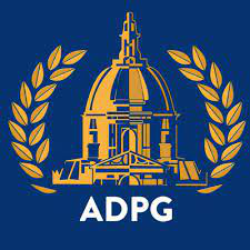
 ► Référence complète : Frison-Roche, M.A., La fonction sociale du Droit de la Compliance, Table-ronde "Les nouvelles formes d'un Droit embrassant son rôle de régulation", in📅Association du Master de Droit privé de Paris I (ADPG), Le rôle de régulateur social du Droit privé, Paris, 15 avril 2022.
► Référence complète : Frison-Roche, M.A., La fonction sociale du Droit de la Compliance, Table-ronde "Les nouvelles formes d'un Droit embrassant son rôle de régulation", in📅Association du Master de Droit privé de Paris I (ADPG), Le rôle de régulateur social du Droit privé, Paris, 15 avril 2022.
____
📅Lire le programme général du colloque
____
► Présentation générale de la conférence : En raison de la conception générale de la journée, ancrée dans le "Droit privé", mais qui oscillait en permanence sur la définition générale de ce qu'est la "régulation sociale" et qui est constitué depuis plus de vingt ans dans une branche du Droit spécifique, le Droit de la Régulation, parce qu'on m'avait demandé de présenter La fonction sociale du Droit de la Compliance, à un public sans doute peu averti du Droit économique, j'ai procédé de la façon suivante :
Je suis partie du souci actuel accru de savoir si le Droit peut avoir une part pour contenir les forces qui régissent le monde et s'y affrontent. Je suis partie de deux cas pratiques. Le premier irait plutôt vers une réponse positive, est celui de l'adoption en cours du Digital Services Act, législation européenne de Compliance qui utilise la puissance des opérateurs numériques cruciaux qui prévenir et lutte contre la haine et la désinformation dans l'espace numérique. Le second cas pratique qui débute est la possible prise de contrôle de Twitter par Elon Musk, opérée par celui-ci au nom de la "Démocratie" et pour l'instant le peu de contrôle que le Droit en cas.
A partir de de ces deux exemples, j'ai repris la définition du Droit de la Compliance, qui n'est pas la procédure par laquelle certains opérateurs devraient montrer qu'ils respectent la totalité des règles qui leurs sont applicables mais qui est substantiellement défini par des buts monumentaux substantiellement voulus posés par le Politique qui trouvent des alliés, volontaires ou contraints, en position de le faire. Ce Droit Ex Ante porte sur le futur, est de nature systémique et utilise des moyens qui traversent toutes les branches du Droit, notamment le contrat et la responsabilité.
Le Droit de la Compliance est le prolongement du Droit de la Régulation. Il opère une régulation sociale et présente trois caractéristiques. Il est forcément mondial. Il est forcément politique. Il est forcément humain.
____
Pour aller plus loin⤵️
📝Le droit de la Régulation, 2001
📝Le Droit de la Compliance, 2016
April 14, 2022
Publications

♾️ suivre Marie-Anne Frison-Roche sur LinkedIn
♾️ s'abonner à la Newsletter MAFR Regulation, Compliance, Law
____
► Référence complète : Frison-Roche, M.-A., Les Buts Monumentaux, cœur battant du Droit de la Compliance, in Frison-Roche, M.-A. (dir.), Les buts monumentaux de la Compliance, collection "Régulations & Compliance", Journal of Regulation & Compliance (JoRC) et Dalloz, à paraître.
____
► lire le document de travail sur lequel cet article est basé
___
► Résumé de l'article : L'on peut définir cette branche du droit comme l'ensemble des procédés obligeant les entreprises à donner à voir qu'elles respectent l'ensemble des réglementations qui s'appliquent à elles. L'on peut aussi définir cette branche par un cœur normatif : les "buts monumentaux". Ceux-ci permettent de rendre compte du droit positif nouveau, rendu ainsi plus clair, accessible et anticipable. Ils reposent sur un pari, celui du souci de l'autre que les êtres humains peuvent avoir en commun, forme d'universalité.
Par les Buts Monumentaux, apparaît une définition du Droit de la Compliance qui est nouvelle, originale et spécifique. Ce terme nouveau de "Compliance" désigne en effet une ambition nouvelle : que ne se renouvelle pas à l'avenir une catastrophe systémique. Ce But Monumental a été dessiné par l'Histoire, ce qui lui donne une dimension différente aux États-Unis et en Europe. Mais le cœur est commun en Occident, car il s'agit toujours de détecter et de prévenir ce qui pourrait produire une catastrophe systémique future, ce qui relève de "buts monumentaux négatifs", voire d'agir pour que l'avenir soit différent positivement ("buts monumentaux positifs"), l'ensemble s'articulant dans la notion de "souci d'autrui", les Buts Monumentaux unifiant ainsi le Droit de la Compliance.
En cela, ils révèlent et renforcent la nature toujours systémique du Droit de la compliance, comme gestion des risques systémiques et prolongement du Droit de la Régulation, en dehors de tout secteur, ce qui rend disponibles des solutions pour les espaces non-sectoriels, notamment l'espace numérique. Parce que vouloir empêcher le futur (faire qu'un mal n'advienne pas ; faire qu'un bien advienne) est par nature politique. Le Droit de la Compliance concrétise par nature des ambitions de nature politique, notamment dans ses buts monumentaux positifs, notamment l'égalité effectif entre les êtres humains, y compris les êtres humains géographiquement lointains ou futurs.
Les conséquences pratiques de cette définition du Droit de la Compliance par les Buts Monumentaux sont immenses. A contrario, cela permet d'éviter les excès d'un "droit de la conformité" visant à l'effectivité de toutes les réglementations applicables, perspective très dangereuse. Cela permet de sélectionner les outils efficaces au regard de ces buts, de saisir l'esprit de la matière sans être enfermé dans son flot de lettres. Cela conduit à ne pas dissocier la puissance requise des entreprises et la supervision permanente que les autorités publiques doivent exercer sur celles-ci.
L'on peut donc attendre beaucoup d'une telle définition du Droit de la Compliance par ses Buts Monumentaux. Elle engendre une alliance entre le Politique, légitime à édicter les Buts Monumentaux, et les opérateurs cruciaux, en position de les concrétiser et désignés parce qu'aptes à le faire. Elle permet de dégager des solutions juridiques globales pour des difficultés systémiques globales a priori insurmontables, notamment en matière climatique et pour la protection effective des personnes dans le monde désormais numérique où nous vivons. Elle exprime des valeurs pouvant réunir les êtres humains.
En cela, le Droit de la Compliance construit sur les Buts Monumentaux constitue aussi un pari. Même si l'exigence de "conformité" s'articule avec cette conception d'avance de ce qu'est le Droit de la Compliance, celui-ci repose sur l'aptitude humaine à être libre, alors que la conformité suppose davantage l'aptitude humaine à obéir.
C'est pourquoi le Droit de la Compliance, défini par les Buts Monumentaux, est essentiel pour notre avenir, alors que le droit de la conformité ne l'est pas.
____
📝 lire la présentation générale du livre, Les Buts Monumentaux de la Compliance, dans lequel l'article est publié.
_____
► Lire les présentations des autres contributions de Marie-Anne Frison-Roche dans cet ouvrage :
📝 Les Buts Monumentaux, cœur battant du Droit de la Compliance,
________

Updated: April 4, 2022 (Initial publication: Oct. 4, 2021)
Publications

🌐follow Marie-Anne Frison-Roche on LinkedIn
🌐subscribe to the Newsletter MAFR. Regulation, Compliance, Law
____
► Full Reference: M.-A. Frison-Roche, The Hypothesis of the category of Systemic Cases brought before the Judge, Working Paper, October 2021 and April 2022.
____
► This working paper has served as the basis for an introductory speech 🎤L'hypothèse de la catégorie des causes systémiques (The Hypothesis of the cateory of Systemic Cases), in a more general conference which I coordinated and moderated, 🧱L'office du juge et les causes systémiques, which is part of a general cycle covering Penser l'office du juge, specific conference attending the 9th May 2002 into the Grand Chamber of the Cour de cassation.
This Working Paper was drawn up in October 2021 to build the conference on the assumption that among the diversity of "cases" brought to the courts by litigants, some constitute a specific category: "systemic cases", justifying treatment that is both specific (in that they are systemic, calling in particular for procedural solutions common to all and distinguishable from the treatment of non-systemic cases) and common treatment beyond the diversity of judges who deal with them (judicial and administrative judges, criminal and non-criminal judges, French and non-French judges, judges of the member-States legal orders and European Union judges, etc.).
This working paper does not aim to deal with the whole subject, i.e. both to determine this category of "systemic causes" and the consequences that must be drawn from it for the judge's office, since that is the very purpose of the conference, which is built around several presentations: it aims to deal with the first part of the subject, i.e. the very existence of this new processual category, which is "systemic causes", leaving for other work the practical consequences to be drawn from it in the processual treatment that it calls for.
____
📝This Working Paper is also the basis of a forthcoming article
____
► Summary of the Working Paper: xx
________
Read below the developments⤵️
April 2, 2022
Compliance: at the moment

March 31, 2022
Publications

♾️ follow Marie-Anne Frison-Roche on LinkedIn
♾️ subscribe to the Newsletter MAFR Regulation, Compliance, Law
____
► Full Reference: FM.-A. Frison-Roche, La responsabilité ex ante, pilier du droit de la compliance ("Ex-Ante Responsibility, Compliance Law Pillar"), D.2022, chronique MAFR - Droit de la Compliance, Recueil Dalloz, March 31, 2022.
____
► Article English Summary: The Law must help to face the future, which can be totally catastrophic in terms of climate and digital issues. Courts are s best placed for this, without “governing”, only relying on the commitments made by companies, governments, and legislators. On the ordinary Tort Law, court decisions oblige these different entities to be consistent in the commitments they have made, obliging them to act in the future, formal “compliance” with the regulations cannot be sufficient. This ex-ante responsibility, founding the powers, thus constitutes a pillar of a substantial Compliance Law, showing the part that CSR and the companies with a raison d'être play in it.
____
📝 read the article. (written in French)
____
📚go to the presentation of the other articles published in this Chronique Droit de la Compliance made in the Recueil Dalloz.
________
March 31, 2022
Thesaurus : Doctrine

► Full Reference: E. Silva-Romero & R. Legru, "What place is there for compliance in investment arbitration?", in M.-A. Frison-Roche (ed.), Compliance Jurisdictionalisation, Journal of Regulation & Compliance (JoRC) and Bruylant, coll. "Compliance & Regulation", to be published.
____
📘read a general presentation of the book, Compliance Jurisdictionalisation, in which this article is published
____
► The summary below describes an article that follows an intervention in the scientific manifestation Compliance et Arbitrage, co-organised by the Journal of Regulation & Compliance (JoRC) and the University Panthéon-Assas (Paris II). This conference was designed by Marie-Anne Frison-Roche and Jean-Baptiste Racine, scientific co-directors, and took place in Paris II University on March 31, 2021.
In the book, the article will be published in Title III, devoted to: Compliance et Arbitrage.
____
► Summary of the article: The authors emphasize the new and growing place of Compliance in International Arbitration, particularly in the requirement of respect for ethical values, since arbitrators can implement Ethics, sometimes lacking in international trade, or even must put their power only at the service of investors who respect the Rule of Law.
Thus, Compliance is deployed through the classic control by the arbitrators of the legality of the investment, which applies both to the establishment of the treaty itself and to the investor. In a more recent way, the arbitrator can control about an investment project a sort of "social license to operate" of the investor, concept related to the social responsibility of the companies, appeared for the protection of the peoples indigenous. Moreover, Compliance can justify a substantial assessment by the arbitrator of the effective respect of the human rights and the environment protection via an investment treaty, the State party remaining able to act for the effectiveness of these concerns.
____
🦉This article is available in full text to those registered for Professor Marie-Anne Frison-Roche's courses
________
March 29, 2022
Conferences
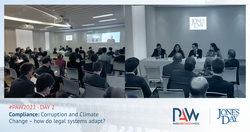
 ► Full reference: Frison-Roche, M.A., The part of Compliance Law in the fight against Corruption and Climate Change, in Paris Arbitration Week (PAW), Compliance: Corruption and Climate Change - how legal systems adapt?, Jones Day, March 29, 2022.
► Full reference: Frison-Roche, M.A., The part of Compliance Law in the fight against Corruption and Climate Change, in Paris Arbitration Week (PAW), Compliance: Corruption and Climate Change - how legal systems adapt?, Jones Day, March 29, 2022.
Debate with Mathias Audit coordinated by Claire Pauly, Vice-President of the Paris Arbitration Week.
____
► Presentation of the intervention: After the presentation made by Mathias Audit of the consideration of facts of corruption, notably by the red flags method, in an arbitration trial, it seems a low-performing system of proof in compliance: the more diligent a party is in showing that it tried to meet its compliance obligations, the more it is exposed to demonstrating its own failure to doing so. It seems a perversity … Therefore, I can understand why companies often so dislike Compliance Law because more they make efforts, more they put money and more they are punished…
But this representation is not totally exact.
My first observation is about the definitions themselves. It is particularly important to have a precise definition of “compliance obligations”, to not confuse them with obligations coming from Criminal Law. The confusion between Criminal Law and Compliance Law is frequent, maybe because what Compliance Law want to eradicate is also prohibited by Criminal Law, for instance corruption. Indeed, technically criminal legal rules and compliance legal rules have many points of contacts, but they are not the same: the obligations are different, the legal persons obliged are different, the reasoning are different the purposes are different.
Because the general definition of Criminal Law and Compliance Law are different. Criminal Law, very old branch of Law, which prohibits and sanctions corruption, does it for everyone because the singular behavior is wrong (to corrupt; to be corrupted). Compliance Law is a very new branch of Law, is a systemic branch of economic Law, which wants to eradicate in the future mechanisms because they destroy economic systems, such as corruption does. Its wants that not to protect moral values but to protect economic systems. Therefore, Compliance Law asks some entities, large companies, to do something only because they are in position to do so: to detect and to prevent this corruption, in order to obtain in the future, the protection against this systemic risk threating the economic systems. The compliance legal tools are more in Ex Ante than in Ex Post: risk mapping, audit, code of conduct, training, obtention of information through the chains of suppliers.
The proof to give is not the non-corruption everywhere from everyone but this concrete action of prevention and education, companies being entities helping public authorities in this global fight.
More precisely, in this definition Compliance Law is not the general obligation to obey the regulations applicable (because this is simply the definition of Law itself, applicable to everybody). Compliance Law is a very new branch of Law which exists only for some systemic “global policies” (as the title of your manifestation says) applicable only on systemic entities (large companies) in a global perspective: for instance, fighting corruption, fighting money laundering, fighting climate change, fighting discrimination between human beings.
In your example, for fighting corruption, specific legal obligations are taken, such as FCPA (with extraterritorial effects) or in French legal system the so-called the 2016 “Sapin 2” Law. These obligations don’t concern everybody: they concern entities in position to do so: large companies.
My second remark is about the burden of proof. These compliance obligation or compliance duties are obligations of means. Companies are obliged to adopt Compliance plans, organize risk mapping, and so on. A lot of them organize them through code of compliance, or code of ethic, or code of corporate social responsibility, because Compliance Law is in an intimacy with Corporate Law. Because Compliance Law is a very concrete branch of law, these disposals are adopted at the level of the group and replicated in the contracts with suppliers.
But he success of these compliance tools is only an obligation of means. For instance the supervisory authority does not require the company to have seen all the risks, in their existence or their exact quantification. In this sense, about money laundering, the French Financial Markets Authority said that the setup of these compliance tools must be “effective”, but after that the company must only do its “best efforts” to aim an “efficient” result (obligation de moyens). The French Regulatory Authority for the digital space says the same about the eradication of speeches of hate that Compliance Law oblige digital companies to fight (using the term of obligation de moyens).
Moreover, about corruption, the Commission of sanction of the French Anticorruption Agency said in a decision of July 2019 that the firm is free to choose the technics to detect and to prevent the corruption (confirming that Compliance is not just following what the Regulator says), but offered a legal certainty: if the company just follows what the Regulators had said in its guideline (rule based compliance behavior), it is no more possible to punish it.
My third remarks could be a proposal for a more efficient system of proof. It is true that the burden of proof is on the company’s shoulders. But the object of proof is not the absence of corruption (it would not be possible…). The object of proof is the existence of due diligence to detect and prevent corruption.
Companies must prepare that, must constitute these proofs by advance. “Due diligence” is a legal concept frequently used in Compliance Law. Regulators, supervisors, and courts ask companies to show the reality of these diligences. It would not be sufficient to present the cost of Compliance… It will be sufficient to show the effectivity of Compliance programs freely adopted, taking in consideration the guidelines released by public authorities.
Public authorities say they want to help companies to diffuse an effective “culture of compliance” : a dialogue with civil and corporate courts, not only with criminal courts would be efficient, for instance for the protection of human rights.
In a second part of this debate, on Climate change and Compliance, Claire Pauly asked the question: "My question is two-fold: do you consider that climate change issues should be treated in the same way as corruption issues? And do you think that arbitrators are well suited to tackle those issues, by upholding the method applied to determine and demonstrate corruption issues?".
The response has been:
Firstly, on the technical similarity between fighting Corruption and fighting Climate Change in Compliance Law, it is the same perspective effectively.
If we come back to the definition of Compliance Law, the Compliance tools are organized to obtain in the future systemics results, such as no more corruption, no more money laundering, what we can name “Monumental goals”. This is a political decision: to design the future for excluding some systemic catastrophes. Corruption is an example of systemic risk; but climate change is another one.
Fighting against Climate Change is a Monumental Goal, of the same nature than fighting Corruption.
As everyone knows, we suffer of a lack of tools to address one of this fundamental challenge of our times which is climate change (more difficult than corruption...). But we are lucky to have some Compliance legal tools: we need to use them, because we have so few techniques about this Climate issue…
And Compliance Law is the more adequate branch of Law because it is an Ex-Ante branch of Law : generally, its obligations are on the future, and the Climate change drama is in the future also.
We can already see that Compliance Law is applicable to Climate Change issue
It is easy to see it through the legal techniques.
In the French legal system, the Sapin 2 law invented in 2016 some new compliance techniques, such as risk mapping, audit, due diligence, to detect and prevent corruption.
One year after, in 2017, the so-called Loi Vigilance took the same techniques, copying exactly the legal dispositions of Sapin 2 in this law to oblige large companies to detect and to prevent violation of human rights and environmental obligation, not only inside the corporate group but also through the supply chains. The manager will be accountable for that.
On February 23, 2022, the European Commission adopted a proposal for a European Directive in the same direction of a “global policy” to impose a “corporate sustainability due diligence” on large companies, notably for fighting climate change. This new text will be effective in two years in the Internal legal systems.
By a rules-based analysis and a principle-based analysis, we can see this is the same reasoning.
Of course, this “corporate sustainability due diligence” is only an obligation of means.
But it is extremely ambitious, linked to the direct consideration of the Corporate Social Responsibility.
And I guess it will be efficient because all these tools are not only Ex Post but also Ex Ante: when the issue is to exclude the catastrophic perspective of the disappearance of the humankind on our planet, having Compliance Law, this Ex-Ante branch of law, is so precious!
Secondly, about the role of Arbitration in this issue, I am tempted to say: everyone is required in this global crucial policy!
It is quite difficult for a national court to decide on this sort of issue because Climate change is a global issue, while arbitrators are global judges.
Technically it is necessary and technically possible that Arbitration takes its place, because these due diligences about detection, prevention, action for a better Climate balance are organized non only in corporate mechanisms, such as code of conduct, corporate commitments, or manager remuneration calculation, but also a lot of contractual dispositions.
We will see a lot of new legal techniques: a lot of international public global policies will be adopted. The obligation to give information about that not only to investor but also to stakeholders will be adopted worldwide. The technique of “compliance by design” will be used on the corporate policy of fighting against Climate change.
Meanwhile, the classical branch of law, were Compliance Law steps in, will remain active, such as International Law, Corporate Law, Tort Law Contract Law, where Arbitration is so central.
So, in short, your question was: are Arbitrators able to deal with climate change issue? my response is: “oh, yes!”
____
► Read the repport made by the fait par la Paris Week of Arbitration ( on the distinction between Compliance Law and Criminal Law, and their articulation)
____
Pour aller plus loin⤵️
📘Frison-Roche, M.-A. (ed), Compliance Monumental Goals, 2022.
📘Frison-Roche, M.-A. (ed), Compliance Jurisdictionalisation, 2022.
________
March 24, 2022
Interviews

► Full Reference: Frison-Roche, M.A.,, "Faire du Droit pour qu'à l'avenir le monde soit moins injuste" - à propos du projet de directive européenne sur le devoir de vigilance ("Making Compliance Law for a world less unfair in the future" - about the draft European directive on the corporate sustainability due diligence), interview with Olivia Dufour, Actu-Juridique, March 24, 2022.
____
💬 read the interview (in French)
___
► Interview English Summary: This interview comments on the draft directive presented by the European Commission aimed at unifying European Union Law about Corporate Sustainability Due diligence in global supply chains to protect environnement and human rights effectively, putting companies under same legal rules. including non-European companies.
The interview emphasizes that this text and reinforces Compliance Law perspective in that the legal instruments are Ex Ante, aim at the functioning of groups, constitute incentives, and seek effectiveness to prevent violations of human rights and the environment, 80% of which taking place outside the European Union.
The goal is both ethical, for example to fight against child labor and the endangerment of people, and systemic: the promoting of a sustainable economy, through the help of companies which have some power in value chains which are global.
This future directive clearly shows the difference between simple "conformity" (just obeying all applicable regulations...) and "compliance", illustrated here: aiming to achieve "monumental goals", here fighting against attacks on the climate balance and protect people, to obtain in the future these damages do not occur or are reduced.
________
March 23, 2022
Thesaurus : Doctrine
► Référence complète : A. Menais (dir.), Raison d'être, engagement et responsabilité, préf. B. Le Marie, postace O. Grégoire, EMS Éditions, 2022, 192 p.
____
► Présentation de l'ouvrage (faite par l'éditeur) : C’est une révolution calme, certes, mais une vraie révolution sociétale que la loi Pacte a engagée.
Au-delà du droit, c’est en effet un nouvel espace qui s’ouvre pour équilibrer les relations entre État, entreprises et individus ; un espace qui permet de construire au-delà du capitalisme à un moment où les effets de la pandémie mondiale ont créé, de facto, les conditions du changement.
Cet ouvrage collectif ne prétend pas résoudre l’apparent paradoxe entre attentes de changements profonds sur le long terme et envie d’immédiateté de résultats, mais bien de mettre en lumière les enjeux juridiques, humains et sociaux, en particulier la responsabilité de l’entreprise et de ses dirigeants, qu’emportent les nouvelles notions établies par la loi du 22 mai 2019.
Les témoignages des experts en ressources humaines, en théories des organisations, des investisseurs, des économistes et des dirigeants, contributeurs à cet ouvrage, permettent d’appréhender les défi s inédits dévoilés par la définition des raisons d’être et des missions pour l’entreprise. Ils livrent des regards différents et complémentaires sur la nouvelle finalité des entreprises et des institutions : leur raison d’être. Ce sont des pionniers engagés qui témoignent de leurs choix, du chemin qu’ils ont parcouru et parfois entamé bien avant que la loi n’existe, et des attentes nées de ce changement.
____
► Auteurs des contributions : Jean-Paul Agon, Jean-David Aurange, Ludovic Aventin, Jean-Paul Berthomé, Christophe Bonduelle, Franck Carnero, Sophie Chambon-Diallo, Yves Chapot, Hervé Coureil, Jean-Marc Daniel, Bruno Dondero, Emmanuelle Duez, Charlotte Duthoo, Geneviève Férone-Creuzet, Ashley Grice, Nicolas Guérin, Armand Hatchuel, Martin Hitzer, Augustin Jaclin, Emery Jacquillat, Sophie Javary, Eric Labaye, Kevin Levillain, Caroline de la Marnierre, Adeline Lescanne Gautier, Helle Liautaud, Didier Martin, Colin Mayer, Lynn Paine, Alissa Pelatan, Alexandre Perra, Fanny Picard, Floriane de Saint Pierre, Blanche Segrestin, Julie Serrier, Dominique Stucki, Thibault de Tersant, Mathias Vicherat et Frank Wismer
____
March 23, 2022
Publications
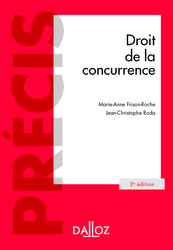
► Full Reference: M.-A. Frison-Roche & J.-Ch. Roda, Droit de la concurrence (Competition Law), 2nd ed., Paris, Dalloz, "Précis" Serie, 2022, 842 p.
____
► This second edition follows on from the first, written with Marie-Stéphane Payet.
📝read the foreword written in dedication to Marie-Stéphane (in French)
____
📕read the 4th cover of the book (in French)
____
► English Summary of the book: Even if reforms follow one another and upheavals are incessant, whether de facto (digital) or political (apprehension of foreign investment, controversies over objectives), the framework of Competition Law is stable, with French Law and European Law in harmony. Competition Law combines both the Law of competitive markets and the Law of relations between economic players. Its age and homogeneity increase its capacity to find solutions. This book restores the coherence and strength of Competition Law, which, once clarified, is easier to master and anticipate.
The first part therefore sets out the blocks of rules that "protect competitive markets", through mechanisms that are increasingly ex ante, not only merger control but also the control of buyer power, leading to the governance of markets by authorities working together, while sanctions for anti-competitive behaviour restore markets that have been damaged by abuse.
The second part sets out the blocks of rules that "rebalance economic relations". The tools used are often older, but their handling is no less innovative.
____
📕read the table of contents of the book (in French)
____
📝read the review of the book made by the Professor Walid Chaiehloudj in the Concurrences review
________
March 17, 2022
Thesaurus : Doctrine
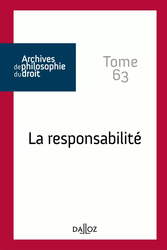
► Référence complète : Archives de Philosophie du Droit (APD), La responsabilité, t. 63, Dalloz, 2022, 505 p.
____
📗lire la 4ième de couverture de l'ouvrage
____
📗lire le sommaire de l'ouvrage
____
► Résumé de l'ouvrage : Les discussions autour de la réforme du droit de la responsabilité civile se poursuivent aujourd'hui dans et hors du Parlement depuis la proposition de loi sénatoriale de juillet 2021. Le tome 63 des Archives de philosophie du droit apporte sa contribution essentielle au débat sur la responsabilité, son rapport avec la liberté et son adaptation aux nouveaux enjeux de la société, tout en lui conservant son rôle de prévention, de régulation et de sanction.
Le volume comprend ainsi une trentaine de contributions de civilistes mais aussi de publicistes, d'historiens, de philosophes, comme celles des plus hauts Magistrats. Il constituera donc une référence incontournable pour la réflexion juridique actuelle comme pour celle des prochaines années.
____
Voir la présentation d'autres tomes des Archives de Philosophie du Droit.
________
March 17, 2022
Conferences

► Référence complète : Frison-Roche, M.-A., L’appréhension du risque climatique par les acteurs privés : les apports du droit de la compliance, in Marta Torre-Schaub M., Lormeteau, B. et Stevignon, A.(dir.), Les risques climatiques à l’épreuve du droit Comment le droit fait-il face aux nouveaux risques engendrés par la crise climatique ? , Université Panthéon-Sorbonne (Paris I), Amphithéâtre Liard, 17 mars 2022.
acteurs privés : les apports du droit de la compliance, in Marta Torre-Schaub M., Lormeteau, B. et Stevignon, A.(dir.), Les risques climatiques à l’épreuve du droit Comment le droit fait-il face aux nouveaux risques engendrés par la crise climatique ? , Université Panthéon-Sorbonne (Paris I), Amphithéâtre Liard, 17 mars 2022.
____
► Consulter le programme général de la manifestation
____
► lire le Document de travail ayant servi de base à cette conférence : Prévention et gestion du risque climatique par le Droit de la Compliance
____
► Résumé de l'intervention : Cette intervention a été placée dans une construction qui la place comme une analyse plus particulière de ce qui serait une "insuffisante appréhension des risques climatiques par le Droit". Peut-être que le juriste estime que le Droit fait toujours une "insuffisante appréhension" de tout, parce qu'il voudrait aussi se saisir de tout, mais ne faut-il pas estimer que le Droit, ici le Droit de la Compliance ne vise pas tout, qu'il est au contraire particulièrement adéquat sur un sujet comme le Climat et qu'en la matière il fait déjà beaucoup ?
Etant acquis qu'une société où le Droit serait tout et dicterait tout ne ferait plus place à la liberté, où les règles ne sont pas là pour nous dire à chaque instant et partout ce que nous devons faire, c'est dans ce souci-là qu'il faut trouver la bonne place que doit avoir le Droit de la Compliance, place qui tient à la définition qu'il faut donner à celui-ci.
Préalable : présentation de ce que doit être le "Droit de la Compliance"
Pour que le principe de liberté demeure il faut que le Droit de la Compliance lui-même exprime des Principes et non pas une masse réglementaire, ce qui étouffe les libertés. Si l'on réduisait le Droit de la Compliance à l'idée étroite de l'efficacité apportée à la masse réglementaire qui nous est applicable, par exemple obéir à la réglementation relative à l'environnement et au Climat, alors nous serions devant un choix dramatique : soit sauver la planète, soit sauver notre liberté. C'est parfois ainsi que l'Avenir nous est présenté.
Mais c'est supposer que le Droit de la Compliance serait défini comme l'accumulation de toutes les réglementations qui nous sont applicables et dont nous devrions montrer par avance et à tous que nous plions devant elles, devant toutes et chacune, aveuglement, le robot étant ainsi notre exemple du bon sujet de Droit de la Compliance. C'est souvent ainsi que ce qu'on appelle alors le "Droit de la Conformité" est défini : nous sommes obligés de nous conformer, et de donner à voir que nous nous conformons, et que nous nous conformons par avance, à toutes les réglementations cumulées et confondues, qui nous concernent. Par exemple celles sur le Climat. Parmi d'autres. Comme les autres. Pas moins mais pas plus. Certes nous ne serions alors pas plus libres que ne le sont les robots, mais la question du Climat pourrait être résolue ...Quelle triste perspective .... L'efficacité de la réglementation aurait donc balayé notre liberté, dont la liberté d'entreprendre n'est qu'un des modes.
L'on voit bien que la question est avant tout une question de définition.
Plutôt que d'aller vers cet "apport catastrophique" que constituerait alors le Droit de la Compliance à la résolution des enjeux climatiques, puisqu'en échange de son efficacité nous devrions rendre nos libertés, allons vers ce qui doit être la définition du Droit de la Compliance et l'apport que ce Droit de la Compliance-là est en train d'opérer au bénéfice du risque climatique. Peut-être d'une façon insuffisante, mais d'une façon déjà considérable.
il apparaît alors que le Climat est un exemple qui va aller grandissant des Buts Monumentaux du Droit de la Compliance (I). Cela justifie l'alliance entre les Autorités politiques et les "acteurs privés" pour que l'avenir se concrétise dans un équilibre systémique, ici l'équilibre climatique (II), justifiant la mise en place de mécanismes juridiques nouveaux par rapport au Droit traditionnel.
____
► Pour aller plus loin :
👩🏫📕Les buts monumentaux de la Compliance, 2022
👩🏫📝 Les Buts Monumentaux, cœur battant du Droit de la Compliance, 2022,
👩🏫🎥 Cas climatique, devoir de vigilance et pouvoirs des juges, 2021
👩🏫🚧 Concevoir les pouvoirs, 2022
👩🏫🚧 La Responsabilité Ex Ante, 2022
👩🏫📓Environnemental Compliance Law, as an Ex Ante Responsability, 2021
👩🏫🎥 Devoir de vigilance des entreprises : vers un Droit de la responsabilité Ex Ante, 2021
________
March 17, 2022
Publications
🌐follow Marie-Anne Frison-Roche on LinkedIn
🌐subscribe to the Newsletter MAFR Regulation, Compliance, Law
____
► Full Reference: M.-A. Frison-Roche, "La responsabilité Ex Ante" ("Ex Ante Responsibility"), in Archives de Philosophie du Droit (APD), La responsabilité, t. 63, Dalloz, 2022, pp. 105-115
____
📝read the article (in French)
____
🚧read the bilingual Working Paper which is the basis of this article, with additional developments, technical references and hyperlinks
____
► English Summary of the article: Today, Law is faced with a strategic imperative: to turn its strength towards the future, to deal with issues (digital and climate) over which law and contract do not have the required influence, because they are too local or too unsystemic, while ex post liability is not adequate to deal with the irreparable. Responsibility therefore takes hold of the future, with the judge becoming the central figure in the world through no fault of his own. This shift in time may continue to be anchored in the past, as a result of commitments made by States or firms. But this responsibility for the future, giving rise to an obligation not to make reparation but to do something about it, may come even more directly from the mere fact that the entity in question is ‘in a position’ to act to ensure that others are protected. Pre-constituted evidence, ex ante office of the judge, duty for others, but also powers of the firm and State to bear this ex ante responsibility, pillar of Compliance Law, Law of the future, are the new rules that are being put in place.
________
March 16, 2022
Teachings : Droit de la régulation bancaire et financière - semestre 2022

 ► Référence complète : Frison-Roche, M.-A., La Régulation internalisée dans les opérateurs bancaires et financiers : le Droit de la Compliance, in Leçons de Droit de la Régulation bancaire et financière, Sciences po (Paris), 16 mars 2022.
► Référence complète : Frison-Roche, M.-A., La Régulation internalisée dans les opérateurs bancaires et financiers : le Droit de la Compliance, in Leçons de Droit de la Régulation bancaire et financière, Sciences po (Paris), 16 mars 2022.
____
► Résumé de la leçon sur le Droit de la Compliance : La Compliance, ne serait-ce que par ce terme même, est un mécanisme nouveau dans les systèmes juridiques européens, venant en convergence du Droit de la concurrence, du Droit financier et du Droit du commerce international. L'on considère généralement qu'il provient du Droit financier et du Droit américain, qui développe ainsi d'une façon extraterritoriale ses conceptions juridico-financières.
Est ainsi en train de naître un Droit de la Compliance.
Il pourrait être celui qui disciplinerait l'économie numérique, laquelle croise étroitement l'économie bancaire et financière, qu'elle renouvelle, comme celui qui apportera des solutions pratiques aux enjeux climatiques en ce qu'il est une branche du Droit Ex Ante et que, contrairement au Droit de la Régulation dont il est pourtant le prolongement, il ne dépend pas de l'existence préalablement établie d'un "secteur".
Pour en mesurer l'importance et le développement, qui ne font que commencer, le plus probant est de commencer par sa dernière manifestation en Droit français, à savoir la promulgation en France le 9 décembre 2016 de la loi dite "Sapin 2", suivant de peu la loi du 21 juin 2016 sur les abus de marché et suivie de peu par la loi du 27 janvier 2017 sur le devoir de vigilance des sociétés mère, source d'inspiration du projet de directive européenne déposée par la Commission européenne en 2022.
____
🔎 Accéder aux slides servant de support à la leçon sur l'émergence du Droit de la Compliance
🔎 Revenir aux bases avec le Dictionnaire bilingue du Droit de la Régulation et de la Compliance
🔎 Approfondir par la Bibliographie générale de Droit de la Régulation bancaire et financière
🔎 Revenir à la présentation générale du cours
🔎 Se reporter au plan général du cours
____
Voir ci-dessous la bibliographie de base et d'approfondissement sur le Droit de la Compliance ⤵️
March 10, 2022
Conferences

► Référence complète : Frison-Roche, M.-A., "Secrets professionnels : spirale d'une importance accrue et d'un affaiblissement fulgurant", participation à la Table-Ronde sur le thème du secret professionnel, in Comité de Liaison des Institutions Ordinales (CLIO), Secret professionnel et indépendance : deux leviers, garants de l’efficacité et de la confiance envers les professions réglementées, 10 mars 2022.
Cette Table-Ronde est animé par Fabrice Lundy, journaliste à Radio-Classique ; y participent également Jean-Luc Sauron, Conseiller d'Etat et Jacques Lucas, Président de l'Agence du Numérique en Santé.
____
►Lire la synthèse écrite du colloque
____
► Revoir la vidéo de la table-ronde
____
► Résumé de l'intervention : Le thème du secret professionnel est appréhendé comme illustration du rôle essentiel joué par les Ordres professionnels dans le monde d'aujourd'hui (le colloque traitant dans un second temps de la question de l'Indépendance).
Avant toute participation active au débat proprement dit, l'intervention a pour utilité de présenter le Secret professionnel en lui-même, puis en quoi le monde actuel apporte des éléments nouveaux au besoin impératifs de celui-ci, dans le même temps qu'il le met particulièrement en difficulté.
I. LA PERMANENCE DES SECRETS PROFESSIONNELS
Le Secret professionnel, comme tout secret, porte sur une information. C'est une information qu'une personne a sur elle-même ou sur une autre, et qui potentiellement peut mettre cette personne en danger, ou la fragilise, ou l'expose, la constituant en situation de faiblesse par rapport à autrui : l'information peut concernant son état de santé, sa filiation, un acte dont un autre pourrait se prévaloir pour la punir plus tard.
Cette information, que la personne garde pour elle ou qu'elle partage avec peu de personnes, elle va la confier à un "professionnel". Pas n'importe quel professionnel : un professionnel en qui elle a confiance, non seulement parce qu'elle croît qu'il est techniquement compétent (un avocat qui connait le Droit, un médecin qui connait la Médecine) mais parce qu'elle croit qu'il va lui aussi garder pour lui cette information sur la faiblesse de son client, malgré le profit qu'il pourrait tirer de la communiquer à d'autres (presse, juge, voisin de table dans un diner, etc.). C'est donc la confiance que la personne en situation de faiblesse a dans le titre même de la personne, parce qu'il est "avocat" ou "médecin" ou "infirmier", etc., qu'il donne cette information, car il sait que parce qu'il est médecin (et pas seulement parce qu'il connait la Médecine), qu'il garde ce secret. Ainsi ce n'est pas le diplôme comme signe de compétence mais le titre comme signe d'appartenance à une profession qui garde les secrets qui est considéré : c'est pourquoi la profession va pouvoir valoriser cette garde des secrets au-delà des frontières par des associations (American Bar Association, par exemple), si elle peut crédibiliser cela (Ordre et secret sont intimes).
Le rapport que le professionnel, nouveau titulaire de l'information, a avec celle-ci découle de cela. Le professionnel est le "gardien" de l'information. Il n'en dispose pas : la personne concernée lui a confié non pas tant l'information que "la garde de l'information". Il exerce donc sur ce secret, c'est-à-dire le fait de ne pas révéler à autrui l'information, un pouvoir📎
Cette conception juridique est stable depuis que les professions, notamment les professions libérales, existent : ce n'est pas par les compétences techniques, ni même par le lien personnel, que le secret professionnel se noue : c'est par l'appartenance à une profession : c'est donc par l'organisation même de cette profession et la crédibilité de celle-ci, le contrôle à l'entrée de qui y entre et doit en sortir en cas de manquement, l'effectivité, l'efficacité et l'efficience de la discipline.
Tout cela n'est pas remis en cause. Au contraire, plus l'Etat a des difficultés en raison de la disparition des frontières et plus cette structure devient en pratique pertinente.
____
Mais le choc vient d'ailleurs. Il faut du fait que précisément si les secrets que nous avons tous en nous et que nous voulons tous donner à garder n'ont pas changé, en revanche le monde dans lequel nous vivons a changé : ce monde est devenu numérique.
II. LE CHOC DU NUMERIQUE SUR LES SECRETS PROFESSIONNELS ET L'URGENCE DE LES ACCROITRE
Or, par cette transformation totale du monde dans lequel nous vivons les secrets n'existent plus, les secrets professionnels pas moins mais pas plus que les autres.
Il faut mais il suffit qu'une "fuite" apparaisse dans l'espace digital et l'information est disponible à la fois partout et en un instant : la viralité est la loi naturelle de l'espace numérique qui recouvre le monde.
L'on peut s'en réjouir, parce que l'information est un bien commun, que nous sommes dans un marché de l'information, une économie de l'information, une société de l'information, une civilisation de l'information.
Si l'on est plus mesuré, l'on dira que certaines informations doivent être gardées par ceux qu'elles concernent et dans le cercle choisi des personnes qui ont leur confiance : c'est l'invention européenne des "données à caractère personnel", qui recoupent largement les secrets professionnels.
Pour l'instant, le Droit tâtonne tant la situation est nouvelle ...
Tout d'abord, le Droit est dans une sorte d'adoration de l'information disponible sur tout, partout et pour tous... Il y développe des principes comme le "droit à l'information" (sans contrepartie financière), le "droit d'alerte" (vite confondu avec le droit de divulguer publiquement, qui n'existe pas ab initio n'apparaissant qu'en cas d'échec du mécanisme d'alerte, le "droit à la transparence" (qui méconnait l'idée même de droits de la défense) qui vont aller de plus en plus contre les secrets, même professionnels.
Ensuite et surtout, la technologie numérique, qui a structuré l'espace numérique fait qu'une information à l'instant où elle est mise dans cet espace est diffusée immédiatement, partout et demeure disponible pour toujours.
Dès lors, l'on peut toujours continuer à affirmer le principe des secrets professionnels, ceux-ci n'ont plus d'effectivité.
Or, et c'est lors le paradoxe, l'espace numérique non seulement n'a pas diminué la fragilité des personnes, fragilité compensée par la confiance dans la garde des secrets conservés par les professionnels ; au contraire le numérique a accru cette fragilité.
Les revenge porn ou les meurtres en direct en sont un exemple : la personne est encore plus fragile dans l'espace numérique. Les "discours de haine" sont un enjeu majeur, non seulement pour la personne qui en est la victime mais pour le système lui-même puisque, comme le démontre Thimothy Snyder c'est aujourd'hui le système démocratique qui peut chuter.
La "désinformation" peut partir d'une violation d'un secret professionnel, car il peut s'agir d'une information exacte exploitée à des fins nocives, constituant alors une infox, le conspirationnisme étant un phénomène lié au numérique.
Que peut faire le Droit ?
Il peut aller dans deux directions :
Tout d'abord armer davantage les structures classiques : Ordres professionnels, police, Autorités de poursuites et Juridictions.
Ensuite, internaliser dans les opérateurs numériques cruciaux, notamment les plateformes, le devoir de bloquer en Ex Ante la diffusion des informations qui doivent demeurer secrètes (données à caractère personnel, et secrets) : c'est le "Droit de la Compliance".
L'exercice de ce devoir par les entreprises numériques cruciales est lui-même supervisé par des autorités publiques : en France, la CNIL et l'Arcom.
De nouveaux textes sont en cours d'adoption pour obliger les entreprises cruciaux de veiller à ce que les secrets ont préservés. C'est l'un des enjeux du Digital Services Act, Réglement de l'Union européenne en cours de discussion.
L'avenir est certainement dans un rapprochement entre les structures classiques, notamment les ordres et ses Autorités publiques de supervision.
Le Droit de la Compliance, nouvelle branche du Droit Ex Ante qui concrétise la garde des secrets peut être une solution dans cette situation à la fois très nouvelle et très préoccupante.
____
► aller à la présentation d'une précédente participation au colloque annuel du CLIO : La déontologie professionnelle dans un monde ouvert et concurrentiel
► voir la publication qui s'en suivit.
___
► pour aller plus loin :
👩🏫Frison-Roche, M.-A., 📝Les droits subjectifs, outils premiers et naturels du Droit de la Compliance, in Frison-Roche, M.-A., 📕Les outils de la Compliance, 2021
👩🏫Frison-Roche, M.-A.,💬 "Et si le secret de l'avocat était l'allié de la lutte contre le blanchiment ?", 2020
👩🏫Frison-Roche, M.-A., 📕Avocats et Ordres au 21ième siècle, 2017
👩🏫Frison-Roche, M.-A., 📕Secrets professionnels, 1999
👩🏫Frison-Roche, M.-A., 📝Déontologie et discipline des professions libérales, 1998
________
Frison-Roche, M.-A., Concevoir le pouvoir, 2022.
Frison-Roche, M.-A., Concevoir le pouvoir, 2022.
March 8, 2022
Hearings by a Committee or Public organisation

🌐suivre Marie-Anne Frison-Roche sur LinkedIn
🌐s'abonner à la Newsletter MAFR Regulation, Compliance, Law
____
► Référence complète : M.-A. Frison-Roche, audition par la Commission des Lois du Sénat sur la Proposition de Loi constitutionnelle relative à l'interruption volontaire de grossesse et à la contraception, 27 septembre 2022.
►Référence complète : M.-A. Frison-Roche, Audition par la Section du Rapport et des Etudes du Conseil d'Etat pour la préparation du Rapport annuel sur Les réseaux sociaux, Conseil d'Etat, 8 mars 2022.
____
►Résumé de la présentation faite avant la discussion : Pour la partie reproductible de cette audition, consistant dans la présentation qui a pu être faite de la relation entre le Droit de la Compliance et le phénomène des réseaux sociaux, il a été repris l'idée générale d'un impératif de "réguler un espace sans ancrage" et l'apport que représente pour cela le Droit de la Compliance, dès l'instant qu'il n'est pas défini comme le fait de "se conformer" à l'ensemble de la réglementation applicable à l'agent mais comme la charge d'atteindre des "Buts Monumentaux", négatifs ou/et positifs, l'opérateurs ainsi chargé de cette obligation de moyens parce qu'il est en position de le faire, devant avoir la puissance pour y parvenir.
Se dégagent alors des notions nouvelles, comme la "Responsabilité Ex Ante" ou une notion de "Pouvoir" qui est commune aux opérateurs de droit privé et de droit public, leur nationalité venant également en second plan, le Droit de la Compliance étant naturellement a-territorial.
Cette définition substantielle du Droit de la Compliance qui met en première ligne les opérateurs requiert que ceux-ci soient supervisé (dans un continuum entre Régulation, Supervision, Compliance,) le Droit de la Compliance opérant un continuum du Droit de la Régulation en n'étant plus lié avec l'impératif d'un secteur. Les opérateurs cruciaux numériques sont ainsi "responsabilisés", grâce à une "responsabilité Ex Ante", et s'ils sont supervisés par des Autorités de supervision (dont le modèle historique est le superviseur bancaire, ici l'Arcom), c'est le juge qui a fait naitre cette nouvelle notion de "responsabilité Ex Ante, pilier du Droit de la Compliance, aujourd'hui délivré du territoire dans une jurisprudence à propos du Climat qu'il convient de concevoir plus largement.
Ainsi délivré du secteur et du territoire, le Droit de la Compliance peut affronter le mal des réseaux sociaux que sont la désinformation et l'atteinte des enfants, maux systémiques où peut se perdre la Démocratie, perspective face à laquelle l'Ex Post est inapproprié.
Le Droit de la Compliance est donc pleinement adéquat.
Il convient que le Juge continue sa mue en concevant lui-même non pas seulement dans un Ex Post plus rapide, mais dans un office Ex Ante, contrôlant des entreprises qui, elles-mêmes doivent avoir des fonctions des offices de gardiens (ici gardiens des limites concernant les contenus).
______
Voir ⤵️ la structure plus formelle de l'intervention, qui fut ensuite discutée
March 5, 2022
Compliance: at the moment

March 2, 2022
Thesaurus : Doctrine
Référence complète : Laroche, B. et Boullu-Chataigner, J., Brave New Planes ou la conformité juridique de grands groupes aéronautiques face aux défis de l'intelligence artificielle, D. IP/IT, 2022, p.83.
____
Feb. 27, 2022
Compliance: at the moment

Feb. 24, 2022
Thesaurus : Doctrine
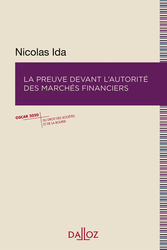
► Référence complète : N. Ida, La preuve devant l'Autorité des marchés financiers, préf. H. Barbier, avant-propos D. Schmidt, Dalloz, Hors collection Dalloz, 2022, 801. p.
____
► Résumé de l'ouvrage (fait par l'éditeur) : Peut-on servir deux maîtres à la fois ? Cette question biblique est portée à sa cime lorsqu’elle est appliquée au droit, toujours tiraillé entre deux buts antagonistes. Tout comme le droit des contrats s’épuise à faire la synthèse de la liberté et de la solidarité, et le droit des sociétés celle de la collectivité et de l’individu, le droit de la preuve en matière financière doit, comme Monsieur Nicolas Ida l’observe à l’orée de son travail doctoral, « concilier les impératifs d’efficacité et de légitimité de la répression financière ». […]
C’est cette recherche du « point d’équilibre » qui se présente comme l’horizon de la réflexion de l’auteur.
Le plan de thèse de Monsieur Nicolas Ida révèle avec finesse la dualité de la preuve au travers des deux temps de la procédure devant l’AMF. Au cours de cette procédure, la preuve est successivement envisagée comme une opération matérielle, puis comme une opération intellectuelle, selon que l’on se situe au stade des investigations préalables à la notification de griefs ou au stade du jugement devant la Commission des sanctions de l’AMF.
La phase préliminaire de constitution du dossier probatoire est marquée par le renforcement constant des garanties procédurales au bénéfice des personnes visées par les investigations conduites par l’AMF. Ce constat dressé par l’auteur vient en balance de l’essor des pouvoirs de l’AMF – droit de communication de tous documents, d’accès aux locaux professionnels, de procéder à des infiltrations numériques, de perquisition menée par les enquêteurs, etc. – qui ne pouvait qu’appeler des contreforts. […]
Le second temps de l’étude se déprend des preuves matérielles pour se porter sur le raisonnement à partir des preuves ainsi réunies qu’est conduit à tenir la Commission des sanctions de l’AMF. Ce parti pris est en lui-même un apport de la thèse. Le raisonnement probatoire est en effet la boîte noire du droit de la preuve, lequel demeure trop souvent concentré sur les preuves matérielles et leur mode d’administration et d’admissibilité. […]
Finalement, […] les ambitions de la thèse de Monsieur Nicolas Ida conjuguent harmonieusement suggestions spécifiques d’amélioration de la procédure devant l’AMF et propositions plus globales d’évolution du droit de la preuve en général.
Le droit financier se révèle ainsi comme un point d’observation privilégié du droit de la preuve tant il exacerbe les difficultés habituelles que rencontre ce dernier, et oblige donc davantage qu’ailleurs encore, à les transcender.
________
Feb. 23, 2022
Thesaurus : Doctrine
Référence complète : Briatta, G., Concrete steps towards progress in the Banking Union, The European Finance Magazine, fév. 2022, p.116-.
____